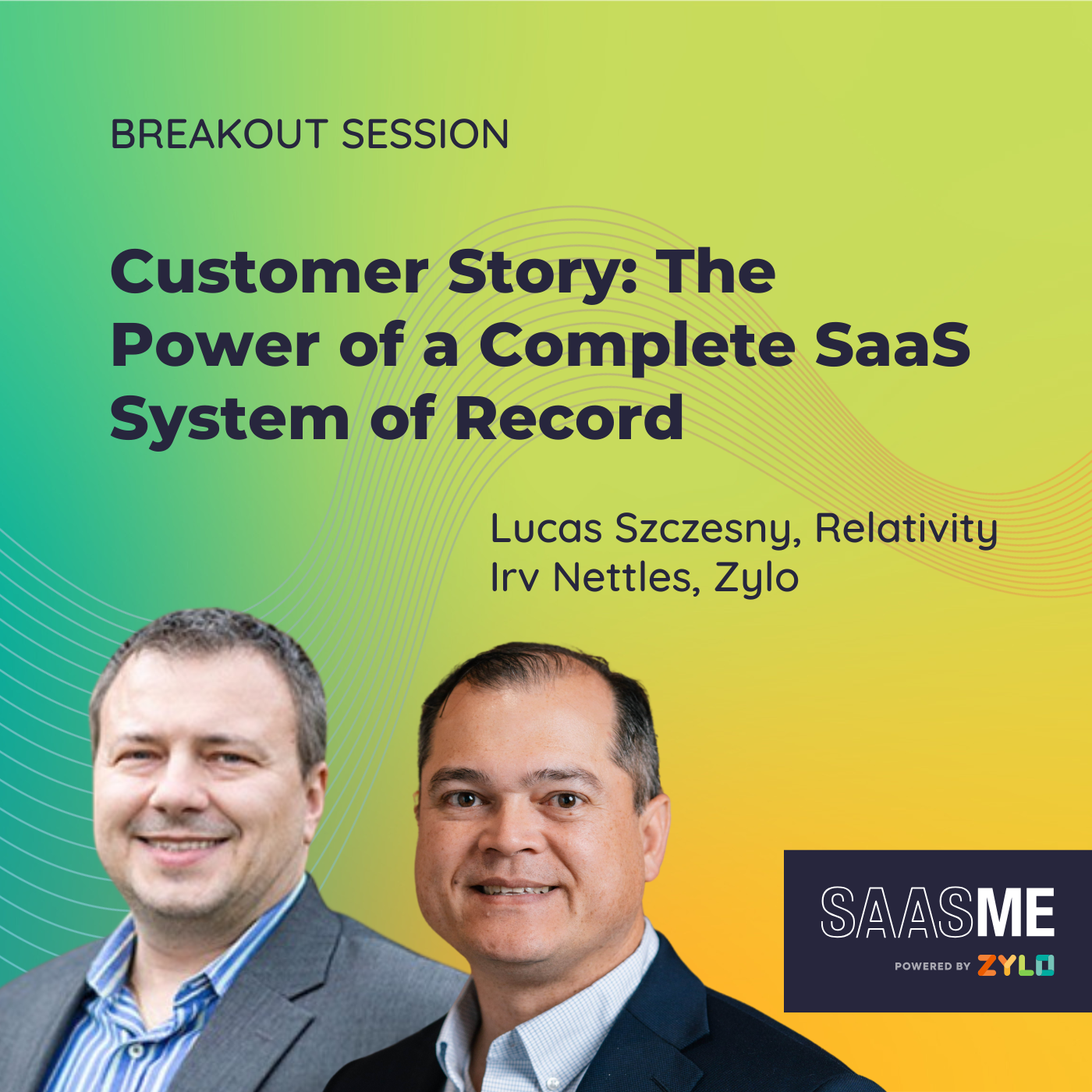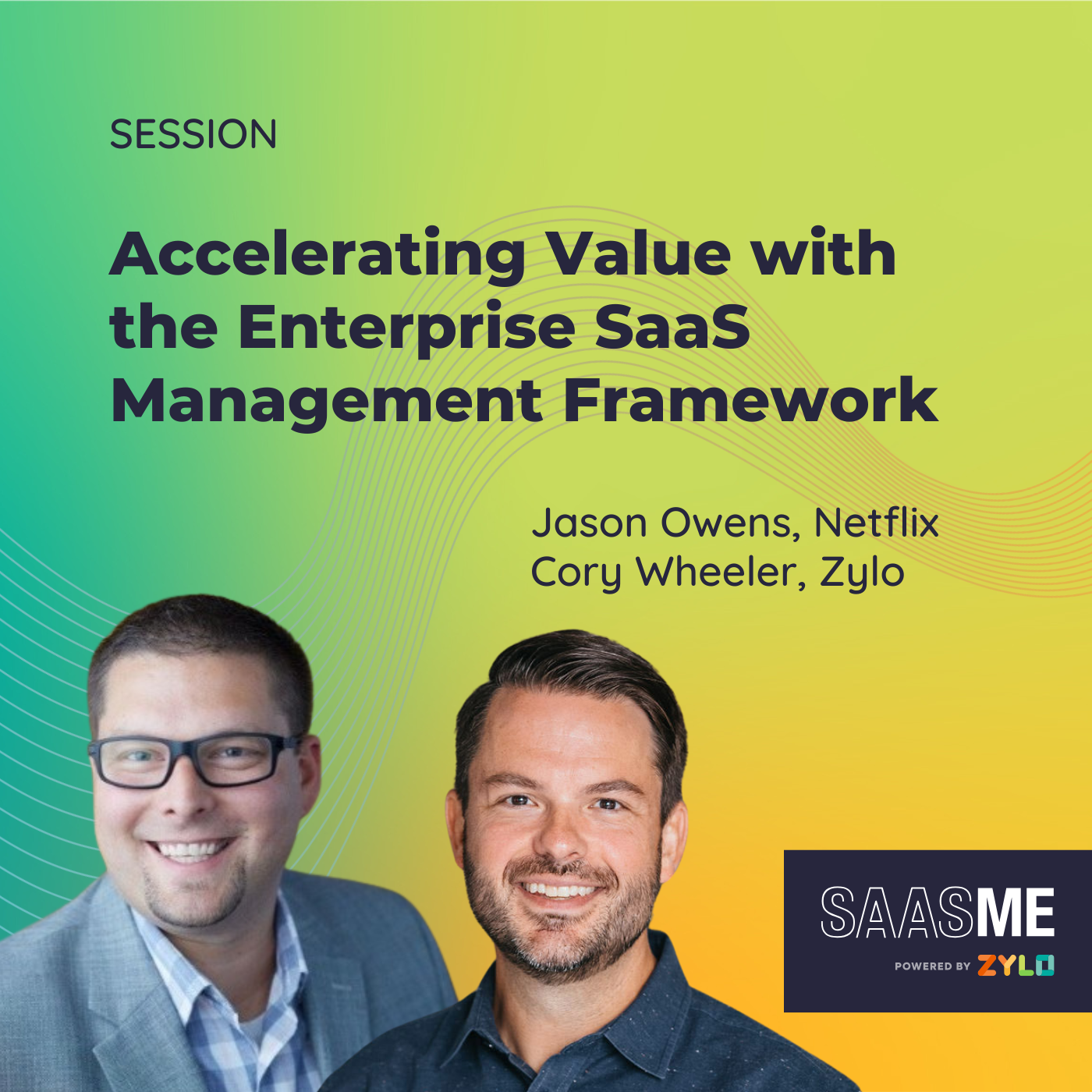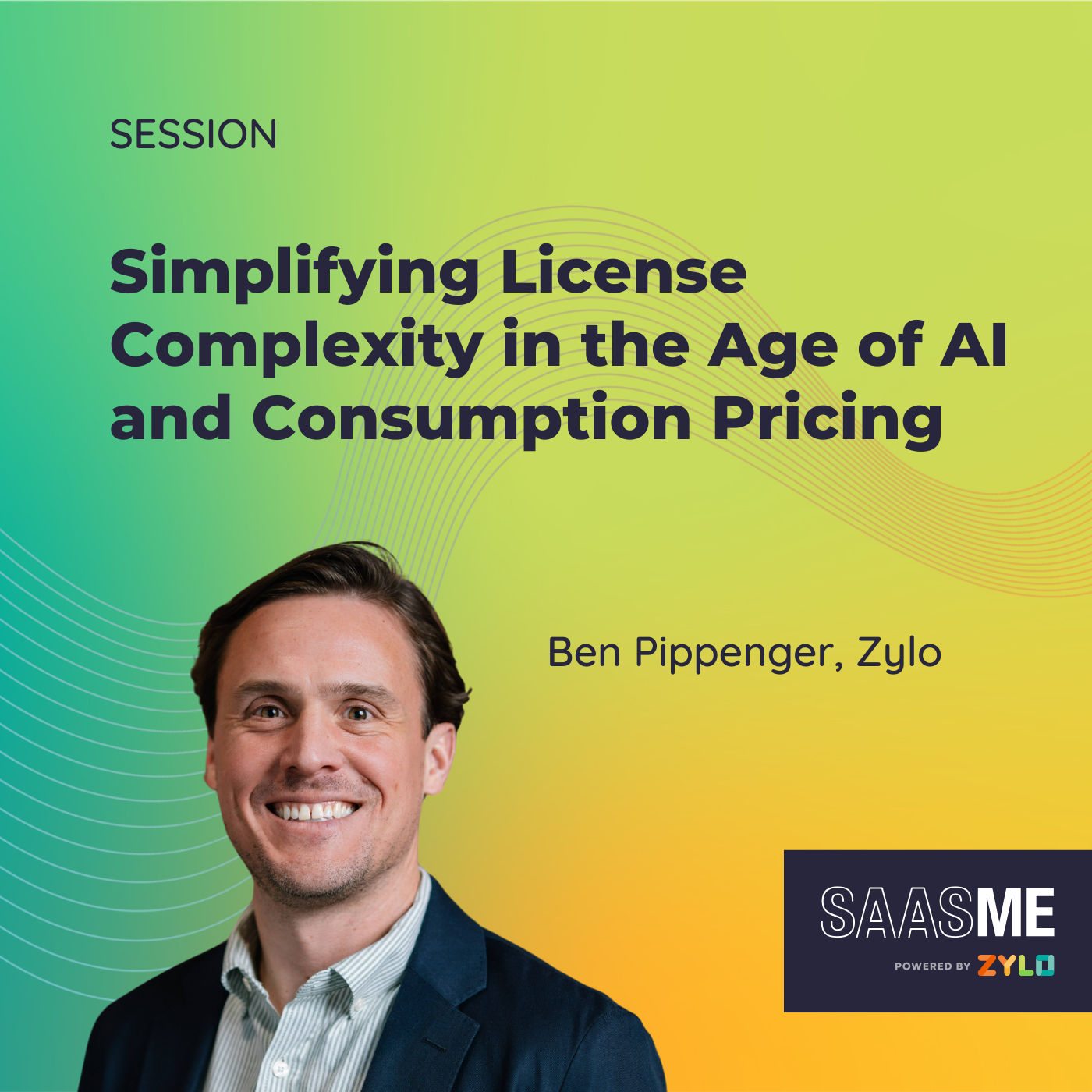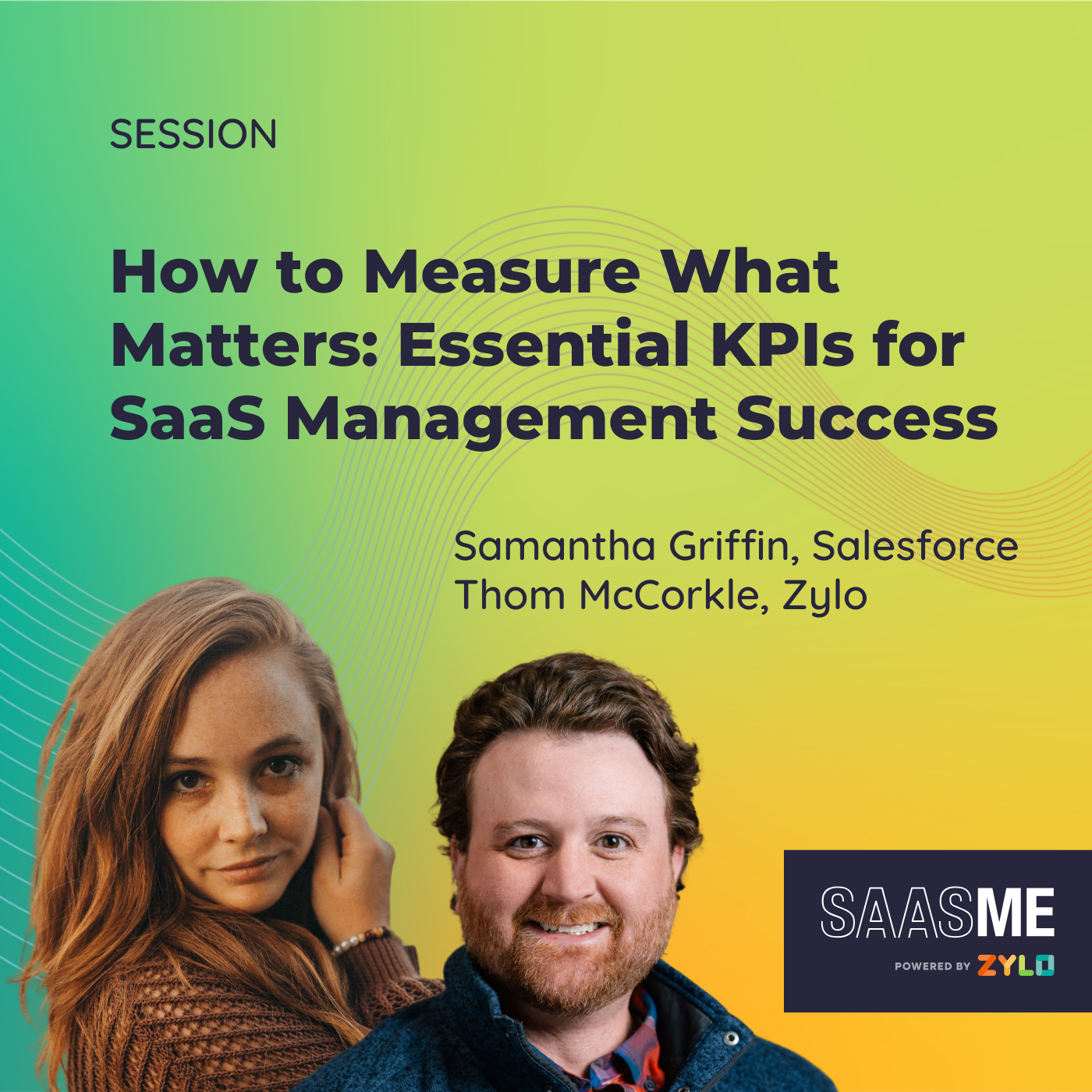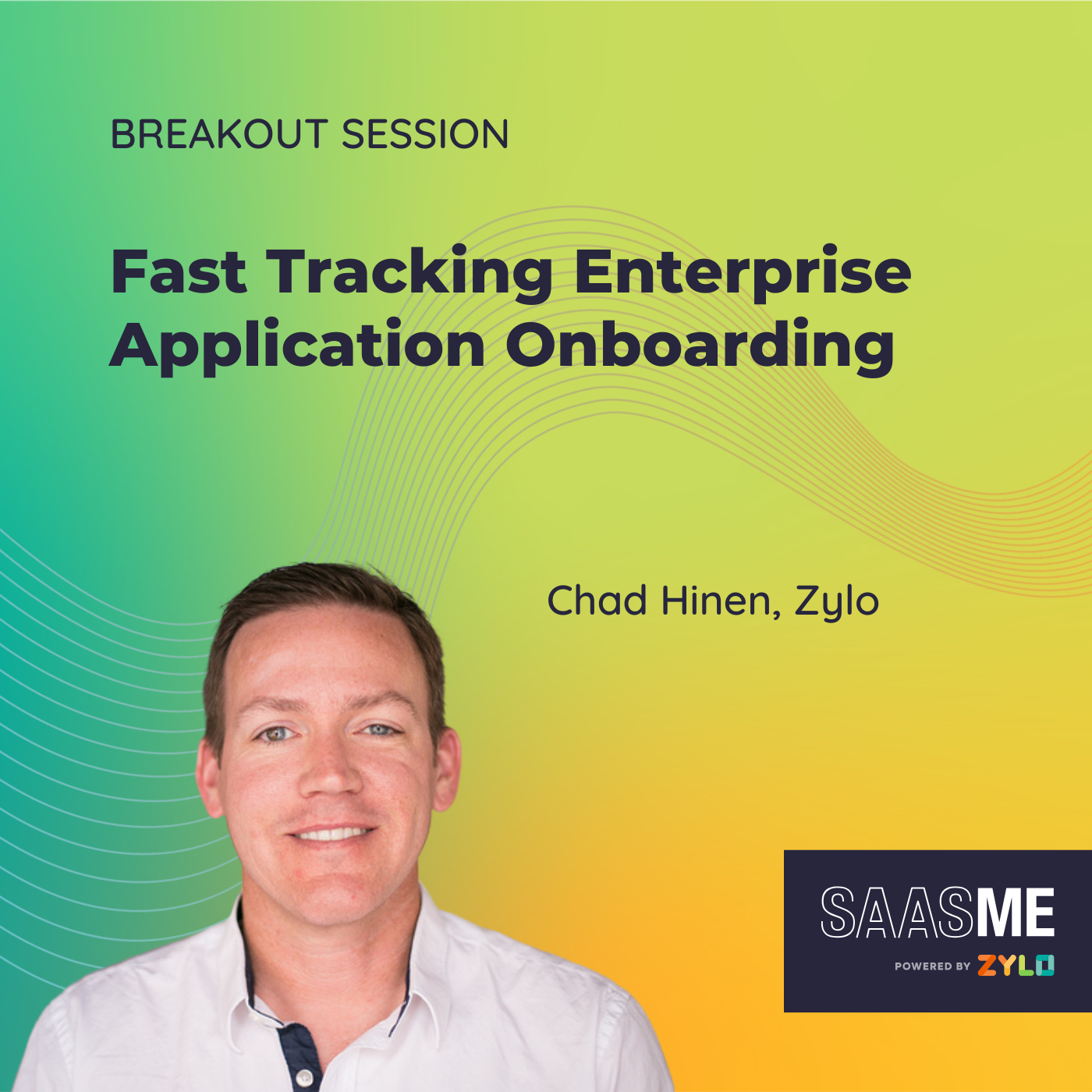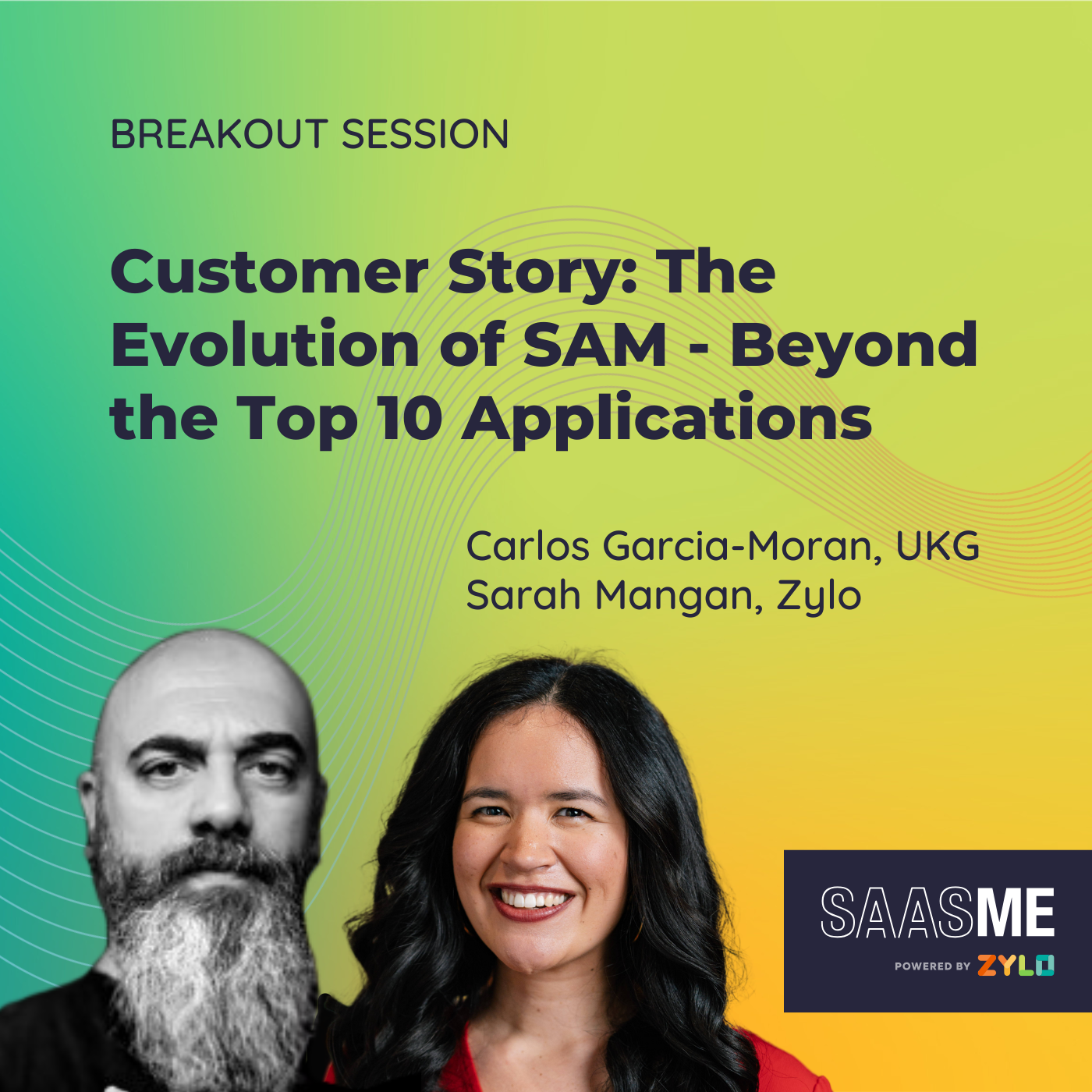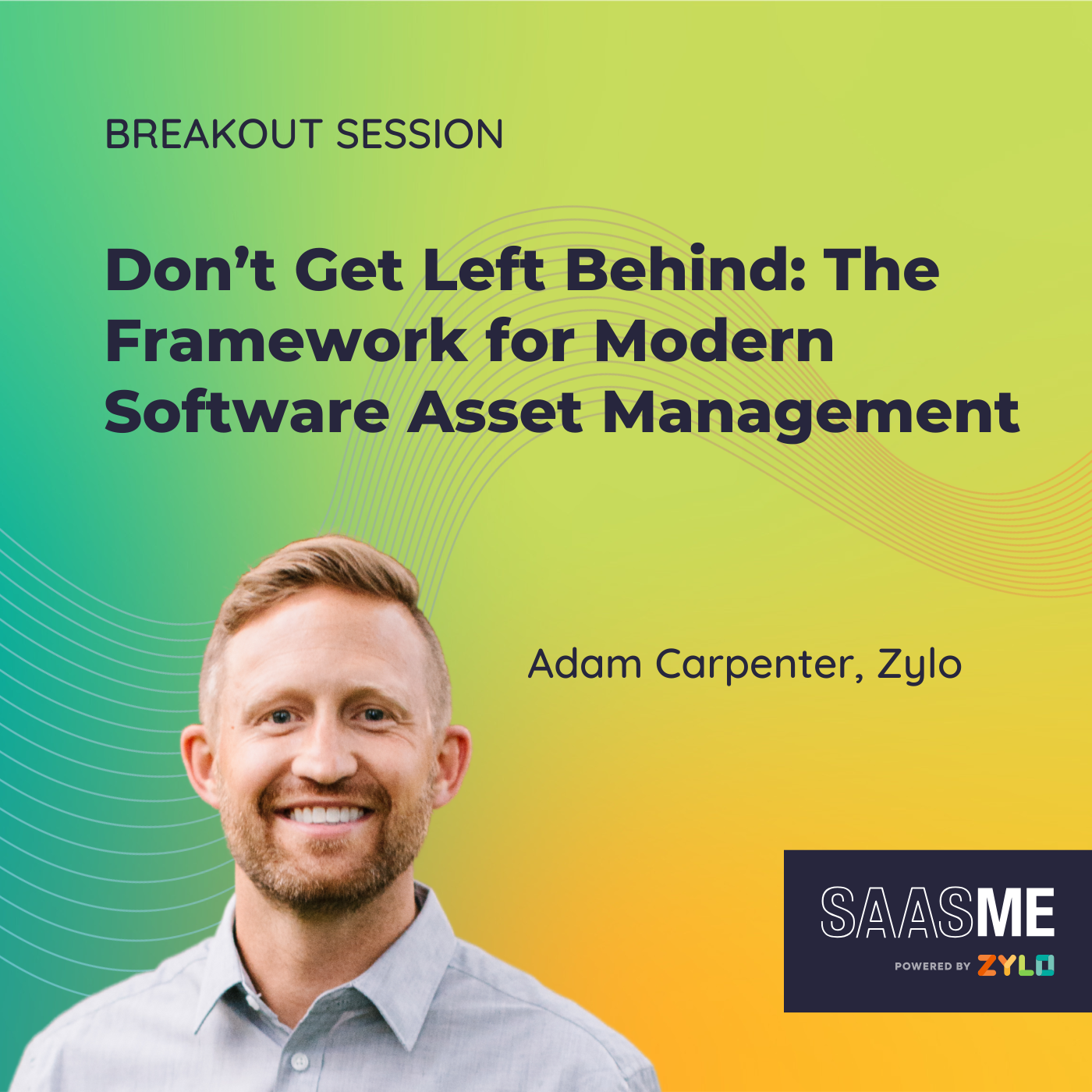Customer Story: The Power of a Complete SaaS System of Record
- 0.5
- 1
- 1.25
- 1.5
- 1.75
- 2
Irv Nettles: 2025. My name is Irv Nettles and I am the Senior Director of Client Success at Zylo. Welcome to our fireside chat regarding the power of a complete SaaS system of record. When I started my career in the late 1990s, I worked in IT, and at that time, all corporate tools were deployed in our data center, which meant that IT had a pretty good grasp of everything being used to run the company. Fast- forward to present day, most companies run their operations via SaaS. This means that almost anyone can purchase and utilize software at a company which presents all types of challenges ranging from spend overages to lack of governance. A complete SaaS system of record can address these issues, centralize, categorize, comprehensive in a current SaaS inventory that brings together financial data, contract data, utilization data, and application of risk data under one umbrella. This allows IT procurement, finance, and SAM teams to work together to achieve these corporate outcomes. Joining us today is Lucas Szczesny, Senior Manager, Enterprise SaaS Management at Relativity. If you didn't know, Relativity is a global, legal e- discovery software solution. Lucas has been in his role for about two and a half years where he was tasked with developing enterprise SaaS governance function. Prior to this, Lucas spent three years as the head of procurement and also has 10 years of experience in consulting and project management. At Relativity, he played a key role in establishing Zylo as the company's central SaaS system of record to address challenges such as rising costs, lack of visibility, and governance issues within their SaaS ecosystem. He also has a passion for negotiation and achieving cost savings. So Lucas, welcome. Thank you for joining me today to share some of your insights to the broader SaaS management community. But before we jump into SaaS management, I wanted to briefly dive into your passion for negotiating and saving money. Rumor has it, you've been wheeling and dealing for quite some time. In fact, I heard you were even cutting deals while you're on your honeymoon. So, would you mind sharing a little that experience with the audience?
Lucas Szczesny: Hi, Irv. Glad you're being here. Thanks for having me. That is a funny story, and actually that's a great, great story to start with. I do have a passion for negotiations and mostly for savings. It's not about the process, it's about the results. And that came out very clearly on my honeymoon when me and my wife, we went to Canary Islands and we went to a nice market on a pier where you go in and as you go down the pier, there is more and more shops that you can visit and buy different things. Right at the very beginning, one of the very first stores, my wife found a store when she left Kebla, was perfect for the beach, perfect for the honeymoon, and she really wanted it. I mean, it was wonderful. I also wanted it, but of course, coming in, I didn't know what were the prices, I didn't know what was happening. I started negotiating, so I was coming down with the price and trying to bundle everything and just driving it as low as possible. I think we came down from like 20 euros, like down to 20 euros. By the end of this process, my wife was giving me weird looks, but we closed the deal and then went down shopping, and as we were going down the pier, I mean, I was able to then compare the pricing as we were going because that blouse, it was coming up every so often, and as we were going, as further we were getting there, the price was going down. At the end, the very last shop, I think the starting price was the euro, the price that I paid for it at the beginning after negotiating for about half an hour. At the very least, I was very happy I didn't overpay. I was happy that I brought in the savings that otherwise would've been a waste of spend. So with that in mind, when my wife learn about what I'm doing right now, said, " Oh great, now you found the passion. You found the work that really fits with you love."
Irv Nettles: Yeah. And so you ended up finding a career in doing exactly that, correct?
Lucas Szczesny: Yeah, that's exactly it.
Irv Nettles: Awesome. Good deal. Well, we appreciate you sharing that. Well, let's jump into a little bit of talk about SaaS management. We're here to talk about a SaaS system of record. So what was going on at Relativity that made getting a SaaS system of record a priority?
Lucas Szczesny: So about two and a half years ago, I was asked to switch from procurement, step into the new role, develop SaaS governance, enterprise SaaS governance function at Relativity, and with that, creating that function from scratch, even though we already had a longstanding relationship with Zylo, I think we were one of your first customers, unfortunately, we went through a period of time where there was really nobody actively managing Zylo, nobody actively managing our SaaS inventory. At that time, we already were facing significant challenges related to the SaaS ecosystem. We had the rising cost, we had the scalability issues, some shadow IT going on. And of course with all of that, increasing compliance risks, the lack of visibility into our SaaS inventory meant that we weren't actively managing our applications, leading to redundant tools, the underutilized licenses, potential for growing compliance risk due to the shadow idea I mentioned, and without centralized system of record, we're essentially operating in the dark. Oftentimes, teams were adapting software independently, making it difficult to enforce governance, to optimize costs, to ensure everyone follows that the policies and procedures we have in place. And it pulled down to significant operational and financial inefficiencies. And that, combined with the fact that we're coming out of COVID with significant pressure to drive the savings across the entire company, it was simply unacceptable. So coming to that role, I very quickly realized that we need to find a way to manage our software more efficiently and across our entire software lifecycle. We needed to build full visibility into what we owned, how it was being used, and where and how we could optimize it. Now, we were lucky enough that we had Zylo in our inventory, and we were able to leverage it as our SaaS system of record, which I always refer to as our SaaS source of truth. And for me, that's not just nice to have, it's a must have. It provided the foundations that are building block for strategic management of our SaaS inventory and allowing us to migrate the risks, control the cost, and then as we go and as we grow, I mean, scale efficiently.
Irv Nettles: Yeah, excellent. Now for a lot of companies, trying to get started can be quite overwhelming. So you started your SaaS system of record with Zylo to address all the issues that you just described, but how did Relativity do that? Walk us through your approach in terms of getting started.
Lucas Szczesny: It was a long process and don't hold it against me, but when we sent out to establish our SaaS system of record, we did not assume Zylo was the best fit. Actually, it was one of my very biggest projects to start with. We put it to the test. I went through the several market evaluation comparing Zylo against all of the major SaaS management and SaaS governance platforms. And fortunately, after months of in- depth reviews, most stakeholder discussions, we confirmed that Zylo was indeed the right tool for us and we can invest the time and money to make it our system of record. At the same time, of course, we set different goals for ourselves to create a new SaaS governance framework, to drive cost savings, to ensure there is a process compliance, increase visibility for stakeholders and leadership, and to build stronger partnerships with the business. To get the head start on that, on those goals, for me, we needed a proof of value very quickly. We decided that we need to start with big wins, focusing on eliminating redundant tools and optimizing our licenses. And at that time, honestly, we had over 500 different SaaS application records showing our stock, and many of those were duplicative and underutilized. So by first focusing on that, tackling those inefficiencies that were big, low- hanging fruit, we demonstrated immediate ROI while laying the groundwork for long- term governance. Now, the success of any system is only as good as data driving it. Hence, we needed to invest a lot of time and effort to ensure that we have accurate and up- to- date information in Zylo, keeping in mind that visibility isn't enough. Real value comes from turning that data into action. The approach helped us to build the momentum, to pivot SaaS management, to be the partner for the business, to be proactive rather than reactive. And I'd say that after about two years, we're finally getting there, and we must remember that the work is ongoing. We can't just set it and forget it. It's continued focus on getting the right data on ongoing innovation into our system of record, and all of that drives us toward success.
Irv Nettles: Yeah, I think one of the things you just said there that's really important to call out is that it's an ongoing program. It's not just a project, like a one- time thing. So yeah, that's really, really great. What surprised you the most once you established your system of record?
Lucas Szczesny: I'd have say that one of our biggest surprises would be how powerful the visibility can be. I mean, suddenly we weren't just seeing the tools we had or the total contract values, we could actually see how they're being used, by whom and how often. That literally changed the game that we played with the business and with the vendors. And I guess with that in mind, we had the measurable surprise of just how much money was being wasted by having unused software, underutilized software across the entire enterprise. For example, we had a training application that only had 20 of its licenses in active use, meaning 80% of the licenses we paid for nothing. They were wasted. In another case... That was a big surprise for me, too. We found high- end marketing and creative tools that were assigned to folks in completely unrelated back office functions. And trust me that honestly, that's not isolated incidents. There were more, these inefficiencies had gone unnoticed for a while. They were building as we were scaling, and gaining visibility into it allowed us to cut costs and also highlighted the need for stronger SaaS governance to prevent this from building even more.
Irv Nettles: And so, that makes me wonder, what was the impact? What happened after you found these savings? What did it allow Relativity to do?
Lucas Szczesny: I'd say the initial impact of finding the savings was pretty immediate, and honestly, it was exciting because the power of those savings, the power of getting those initial goals in, it was not just about cutting the costs. It was about freeing up resources to help our businesses in other critical initiatives. We're able to shift the conversation from SaaS enterprise, SaaS governance coming in as just another boring step in the process, something that causes delays and make folks do more work. I mean, we went in and by showing that enterprise SaaS governance isn't just about control, it's about enabling the business to move faster and be more innovative. It helped a lot. We had business units that were asking for budget money for different projects for a while, and suddenly we were able to come in and say, Hey, you know what? Here's a way to offset it without even asking finance for more money because we can save you some money. In my books, we impacted the business directly. We were able to help engineers be more innovative, and we helped sales teams find more prospects. I mean, take all of that, fast- forward to today, and that success has opened us to drive even deeper cross- departmental collaboration. We're now working with our FP& A team to mature this process even further, like integrating the SaaS data into budget reviews, as well as planning and forecasting, with the goal that it's going to give the teams not only the visibility to their spend, but also the ownership and accountability.
Irv Nettles: Wow. So you guys really are acting more as trusted business advisors across Relativity?
Lucas Szczesny: Yep.
Irv Nettles: Awesome. What is something you can do today that would've been impossible before having a SaaS system of record?
Lucas Szczesny: To avoid sounding like a broken record and talking about visibility again, because it is enabling a lot, I'd say in a sense, Zylo helps me fulfill Relativity's mission, and that is to organize data, discover the truth, and then act on it. Before we started using Zylo the way it's meant to be used, we simply couldn't do that. We knew that we were spending money on software. We had total contract values of X, Y, Z, but we couldn't tie that spend to software level information. We couldn't connect it to the usage, to the outcomes, and now we can see which tools are being used, how frequent they're being used, and when there is an overlap between them. That insight allows us to rationalize our stack, our software inventory, removing duplicative tools, right sizing licenses, even something as simple as relocating spent toward it truly needs to be. We are also able to put more stress on unclear ownership. That's the reallocation as well, which not surprisingly drives accountability. For instance, we have a product development tool that was sitting with IT, sitting with its budget and ownership, with IT having absolutely zero impact on how and where it was being used. I mean, that led to perfect storm. Me being IT, I cared for extra hard because it created unexpected and significant hits in our budget. Now, having the visibility, we're able to look into it, we're able to see where and how it happened. We're able to shift the ownership to the right organization, which then in response, the usage and budget accountability. That drives the real efficiency and measurable savings that impact everybody at Relativity. And honestly, let me tell you, a few years ago we went through a reorg exercise due to a post and acquisition inefficiencies, and that really struck a chord with me. I mean, hence, I honestly do believe that what we do is directly impacting the bottom line, and then in turn, it impacts our success and our jobs.
Irv Nettles: Yeah, no kidding. Tell me a little bit about some of the other business outcomes you have been able to pursue now that you've had a SaaS system of record.
Lucas Szczesny: Let's see. I guess one of the biggest outcomes I've seen is unlocking the level of executive visibility, that's very recent for me, that simply didn't exist before. Leadership can now see our entire SaaS portfolio all in one place. They can track the spend, they can see usage trends, and they can understand that the value they're getting for every dollar that is spent, that kind of insights, it enables more strategic data driven decision- making, they can take that information and decide where to invest or where to pull back. I mean, ultimately, this can now be used by our leadership in the critical processes and decision- making from day- to- day tasks like reviewing the renewals or making software purchasing planning decisions, to things that are critical in the process, like annual planning and budgeting.
Irv Nettles: Yeah, absolutely. So how did you enable this visibility for it that it is?
Lucas Szczesny: Like I mentioned before, that innovation and strategic inaudible was only possible because we put a lot of effort and data into Zylo, making it our SaaS source of truth. Now combine it with the functionality innovation of Zylo, I mean, we took advantage of the functionalities, we took advantage of the customizable fields. We were able to enrich application records with that critical metadata like budgetary ownership, the primary cost drivers, the use cases of how and where the applications are being used. Even something as simple as where is being hosted, which was not tracked before, or how and when to optimize. It was this with the launch of Zylo's new dashboard feature that really enabled us to make all of it happen, a perfect combination of all of the events. We were able to combine it, visualize all of it, enhance the data, and start building tailored reports for different stakeholders. It really is a significant step in our SaaS governance maturity path.
Irv Nettles: Wow. Love hearing that about dashboards. It's such a great feature that we released.
Lucas Szczesny: And we appreciate it.
Irv Nettles: All right, so what's next on your roadmap as it pertains to the SaaS system record?
Lucas Szczesny: Whew, that's a very good question. I like to think about it or joke about it, so to speak, that the next steps on our roadmap is for us to make my life and my colleague's life easier, and bear with me. There is a reason why it's all about making life easier. I mean, one key area where we're looking to focus is visibility into how much we pay for our software through benchmarking data. The key piece of information that our procurement partners can then leverage, and we want that, we want to help them better understand what's being spent, how it compares to the peers, how it compares to the industry standards, and that's going to help us mature the cost savings process, to identify the outliers, like settle realistic price targets during the negotiations and validate the budgets with the real life contacts, right? On the other side, the next thing that we also want to do is, at least for me, that's a major priority, is leverage that the brand new Zylo functionality that is being released now, I think is the enterprise API. I mean, it opens the door of unlocking even more value from our data. We are already looking into integrating our procurement data into the CMBD and then trying to find a ways to put that into Zylo to enrich our source of truth even more. But on the flip side, we also want to push and enrich our data in CMBD using Zylo, which then can help our system management team and IT operation teams in their day- to- day, giving them the benefits and the insights that we build around the ownership, the license consumption, the functionalities, the cost drivers. My brain is racing on possibilities. We can potentially expand on our plans for usage connective capabilities, or we can synchronize the source of truths between different functionalities. I'd like to think that the possibilities are endless, but I know there are some limits.
Irv Nettles: Yeah, it's so exciting. Super pumped also to hear about the enterprise API, and that just became available in our public preview for all of our customers. So, excited to hear about that. Let me know how I can help or how my team can help get you guys up and running with that. So, that'd be fun. Final question, and for everyone tuning in today, as they consider building their own SaaS system of record, what's the number one thing they should keep in mind, the biggest piece of advice that you can impart on them to get started?
Lucas Szczesny: The biggest piece? I'd say the biggest advice that I could give is to invest the time and the resources to create your own SaaS system of record. It's not enough to have a procurement system or an accounting system. To drive the real value, you need the software level visibility. You need to clean your data, get into the right size management system, leverage the insights and innovation that comes with the system like Zylo, and then act on it. For me, that's the secret of the long- term data- driven success.
Irv Nettles: Yeah, absolutely. Great, great advice. Lucas, we're about out of time, so thank you so much for your time today. These lessons and insights are extremely valuable, and I'm sure all of our guests have a better understanding of what a complete SaaS system of record is and how impactful it can be for their organizations. I'm looking forward to my next trip to Chicago so that we can play a few holes on that golf simulator you guys have in the office.
Lucas Szczesny: Absolutely. More than welcome to join me. Well, I'll see you on the green, right?
Irv Nettles: Yeah, that's right. All right, thank you so much, Lucas. Have a wonderful day.
Lucas Szczesny: Thank you, too. Take care.
Irv Nettles: Bye.
Lucas Szczesny: Bye.
DESCRIPTION
Achieving your SaaS Management goals requires reliable, complete, and centralized SaaS data—because data should drive every decision. Discover how Lucas Szczesny, Enterprise SaaS Governance at Relativity, established a centralized system of record that serves as the single source of truth for their SaaS data. You’ll learn how this approach is driving cost optimization, visibility, and improved governance across their software stack.
Speakers:
- Lucas Szczesny, Senior Manager, Enterprise SaaS Governance at Relativity
- Irv Nettles, Senior Director, Customer Success at Zylo
Today's Guests

Lucas Szczesny


